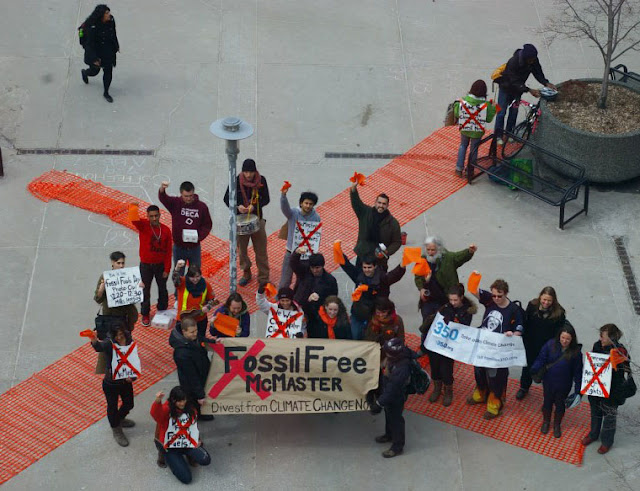MGI and carbon footprint
MacGreenInvest and Carbon Footprint
Reduction
On Wednesday, February 26 the Office of
Financial Affairs at McMaster organized a townhall meeting to outline the
university’s infrastructure and investment policies and plans. Part of the
meeting was taken up with the plan to reduce the university’s carbon footprint.
Reducing carbon footprint is clearly an essential part of addressing the
climate crisis, and McMaster should be applauded to undertaking the initiative
to do this. Carbon footprint represents the consumption of energy derived from
burning fossil fuels, whether this is direct consumption such as using vehicles
powered by internal combustion engines, or indirect such as using electricity
generated in gas-fired power plants. The reduction of carbon footprint entails
two courses of action. The first is conservation—finding ways to consume less
energy by making energy use more efficient and less wasteful, such as
developing more energy-efficient technologies. The second course of action
involves switching from carbon based to non-carbon based sources of energy. In
this respect, the transformation of energy production from fossil fuels to
renewables, such as solar, wind, hydro and geo-thermal, will contribute further
to the reduction of McMaster’s carbon footprint.
Energy consumption and production, in other
words, are inextricably linked. Without addressing energy production, reducing
carbon footprint simply by consuming less and more efficiently will only remain
a half measure. To reduce carbon footprint in any significant sense also means
de-carbonizing energy production. This is the reasoning behind the
MacGreenInvest (MGI) campaign to encourage McMaster to move its endowment fund
investments out of fossil fuels (coal, oil and gas) and into renewable “green”
energy sources, viz. to reduce dependence on energy sources that are the cause
of the climate crisis, and to expand capacity to produce clean alternatives
that help mitigate the crisis. The aim of MGI is not to posit
divestment-reinvestment as an alternative to carbon footprint reduction, but to
see the two courses of action as fully complementary: divestment-reinvestment
is the logical way to facilitate carbon footprint reduction. Tackling the
climate crisis by addressing consumption alone will remain limited in effect at
the same time that continued dependence on carbon based energy only makes the
crisis worse.

Comments
Post a Comment